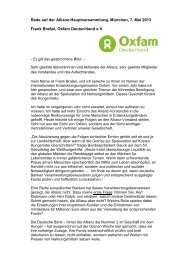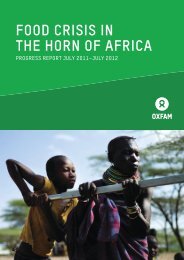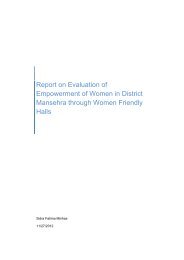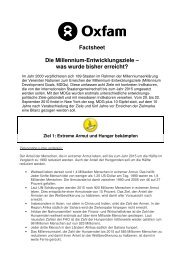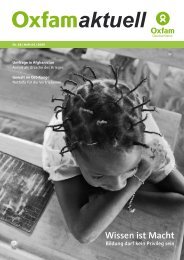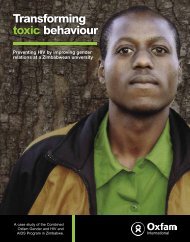No Time to Lose - Oxfam
No Time to Lose - Oxfam
No Time to Lose - Oxfam
Create successful ePaper yourself
Turn your PDF publications into a flip-book with our unique Google optimized e-Paper software.
Promoting Accountability<br />
What’s been done<br />
While there is a long way <strong>to</strong> go, some positive steps have been taken,<br />
both by the international community and by the Ministries of Interior<br />
and Defence, <strong>to</strong>wards enhancing the accountability of the ANSF. The<br />
following section outlines some of the more significant initiatives –<br />
and some of the more significant gaps.<br />
Core Values / Codes of Conduct<br />
Over the past year, NTM-A/CSTC-A has worked with the Afghan<br />
Ministries of Defence and Interior (<strong>to</strong>gether with the UN Office on<br />
Drugs and Crime) <strong>to</strong> develop statements of core values for both the<br />
military and the police. In the case of the ANP, the MoI last year approved<br />
a ‘Commitment of Promise’, pursuant <strong>to</strong> which members of<br />
the police pledge not <strong>to</strong> ‘engage in any disgraceful, dishonest or disorderly<br />
conduct’ including ‘wilfully and purposely violating the legal<br />
rights of any citizen’ or ‘<strong>to</strong>rturing or subjecting another person <strong>to</strong> inhuman<br />
or degrading treatment’. 103 New officers are also required <strong>to</strong><br />
sign an ‘active duty service obligation’, according <strong>to</strong> which they<br />
pledge <strong>to</strong> respect and protect the rights of the Afghan people and <strong>to</strong><br />
comply with the law. 104 The ANA has a draft ‘values statement’ – currently<br />
awaiting the approval of the Ministry of Defence. These documents<br />
do not in themselves create new obligations (being complementary<br />
<strong>to</strong> existing disciplinary regulations) and do not have disciplinary<br />
procedures attached <strong>to</strong> them. In the case of the ANP, a more comprehensive<br />
code of conduct (with disciplinary procedures attached) has<br />
been drafted and is in the process of review. Illiteracy presents an ongoing<br />
challenge, however, with some 30 per cent of police unable <strong>to</strong><br />
read the code of conduct they are required <strong>to</strong> ‘read and understand’.<br />
105 <strong>No</strong>netheless, the development of values statements and<br />
codes of conduct represents a small step forward <strong>to</strong>wards more accountable<br />
security forces.<br />
Complaints and Oversight Mechanisms<br />
The past decade has seen some positive steps <strong>to</strong>wards increasing<br />
oversight of the ANSF – particularly the police. The AIHRC receives<br />
and investigates complaints against all components of the ANSF; and<br />
in 2005, with the support of the AIHRC, the MoI established a Gender<br />
and Human Rights Unit <strong>to</strong> investigate allegations of gender based violence<br />
and human rights violations committed by the police. But these<br />
existing mechanisms face a number of challenges, including a lack of<br />
public outreach, a fear of reporting, and a serious lack of resources.<br />
23




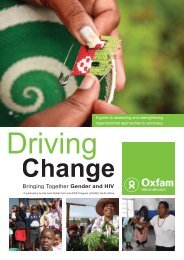

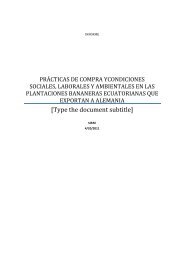
![Download: Faltposter EU-Handelspolitik [PDF 2,17MB] - Germanwatch](https://img.yumpu.com/25095854/1/190x161/download-faltposter-eu-handelspolitik-pdf-217mb-germanwatch.jpg?quality=85)
